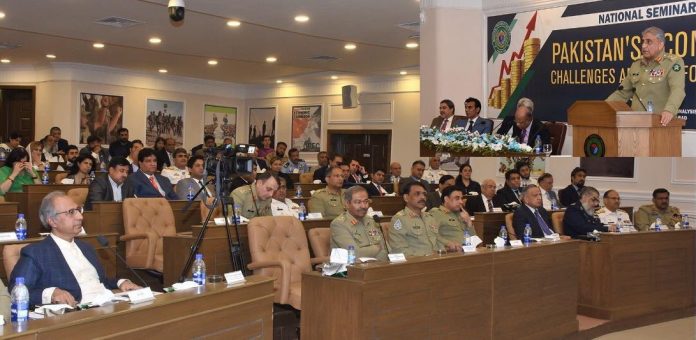ISLAMABAD: Chief of Army Staff General Qamar Bajwa has said that there cannot be any sovereignty in the absence of economic stability, according to an Inter-Services Public Relations (ISPR) press release.
While addressing a seminar, titled, “Pakistan’s Economy: Challenges and Way Forward” at National Defence University Islamabad (NDU) on Friday, Bajwa said the “Armed Forces played their part by voluntarily foregoing annual increase in the defence budget”, adding that “this is not the only step the military has taken for the improvement of the economy”.
General Bajwa highlighted Pakistan’s prolonged efforts towards the restoration of a regional peace that, in his opinion, will lead to better trade connectivity. “We need to have greater regional connectivity for a developed region,” he said.
Referring to the economic seminar, the Army chief said such types of interactions are important to help both government and other stakeholders in exchanging their views on issues of national importance.
In his address, Advisor to PM on Finance Dr Abdul Hafeez Shaikh dilated upon reasons, which resulted in increasing these challenges.
He counted perpetual security threats, inconsistent economic policies, poor economic discipline and lack of will to take tough decisions in the past as major contributors to the economic situation the government is facing today.
The participants of the seminar dilated on identifying challenges and ways to overcome the same.





it is trustworthy and enthusiastic attitude which is ever found in Pakistani Nation in paying their lives and economy in growing Pakistan but not found ethics tolerance transparency in Politician and Bureaucrats to bear each other of them. So why an Army General can take parts alone to preserves a common man from hardship of toilsome in earning brad including the livelihoods for his dependents.
I got this web site from my buddy who shared with me about
this website and now this time I am visiting this web site and
reading very informative articles or reviews at this place.
Wow! Finally I got a web site from where I know how
to actually obtain valuable facts concerning my study and knowledge.